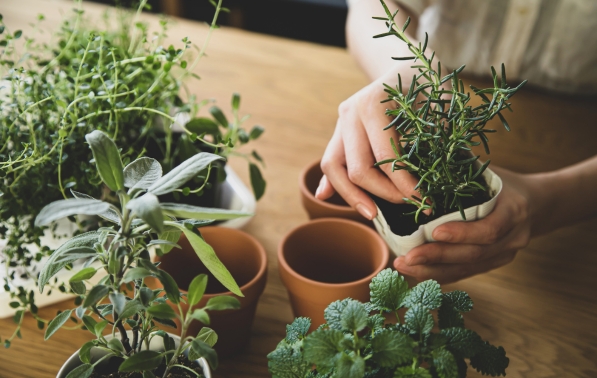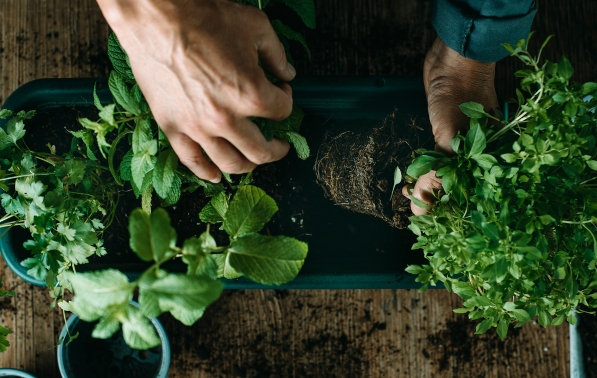Herb Profile: Herb Garden Must Haves
July 29, 2024 | 0 comments
by Wendy Wilson
Begin your garden peppered with nourishing plants to support the healthiest you!
Today we will cover the culinary and beneficial herbs every home garden should have.
CULINARY HERBS
There can be a crossover between culinary and supportive herbs with double benefits. These herbs are commonly found in herb gardens but many may not be aware of their wholesome properties.
Thyme – is often used as a preservative of meats to prevent bacteria and it is also used to support the pulmonary part of the body such as coughs. When used as a seasoning, it pairs well with most meats and is used often in soups and stews.
Oregano - has antimicrobial compounds to prevent food spoilage and is also used to aid digestion. It is commonly used in marinades, sauces, and dressings.
Rosemary – used to prevent spoilage of meats and to help with cognitive issues and eyesight. Rosemary is often used as a fragrance, to season poultry and fish, and in stews.
Ginger – the ancient world used ginger for discomfort issues with the joints. It also assists with circulation to small capillaries as well as helps soothe nausea and aids in digestion. Ginger is also used to flavor dishes globally.
Black pepper – a known benefit is it reduces germs as well as extending the shelf life of foods. It also helps the liver to detox and is known to be a digestive support spice. It pairs well with most other herbs and enhances flavors in savory dishes.
Garlic – one of the most popular herbs used to enhance the flavor of food but it is also effective against bacteria, viruses, and fungi. It is also known throughout history as supportive against the seasonal bug. Garlic can be planted throughout gardens to deter pests.
Habanero peppers – an extra spicy food-enhancing herb that has been found to help with balancing blood pressure and supporting blood flow. It’s useful in other ways such as it carries the nourishing properties of herbs through the system faster. This herb is most commonly found in hot sauces and salsas.
Peppermint – a refreshing plant often used in beverages. It also soothes the stomach and supports digestion after eating. Excellent for stomach aches, nausea, and indigestion as well as a decongestant. Be sure to consider keeping peppermint in a container or pot since this plant is highly invasive and will take over garden beds.
THE SUPPORTIVE HERBS
Many herbs offer the power of nourishing compounds and they can also beautify the garden space. Here are some of our favorites at
Apothecary Herbs.
Echinacea root – the primary action of this root is to increase the number of white blood cells thereby enhancing the immune system to fight off infections quickly. It is effective in bringing balance to viral and bacterial infections, fungus, and nourishing wounds. It is a perennial and there are two popular varieties.
- Echinacea Angustifolia will have long, thin petals, and grows to less than 12 inches high with a rosey-purple to pale purple flower. It does well in zones 4 to 9 and particularly likes high elevations with cold winters.
- Echinacea Purpurea is the choice for residential gardens across America. It has long, stiff stems and one large cone of purple flowers. It grows up to three feet high and is native to Virginia, Georgia, and Louisiana. It is easy to cut and dry and is harvested in late fall. It prefers lower elevations with milder winters.
Find more information on how to grow Echinacea here: https://www.americanmeadows.com/content/perennials/echinacea...;
For more information on harvesting echinacea, check out this blog: https://www.gardeningknowhow.com/ornamental/flowers/coneflow...
Lobelia Inflata – a slender plant with purple flowers that prefers gardens and wooded areas. Another name is Indian tobacco as the Native American Indians would smoke it to dilate the lungs and support breathing. The benefits of lobelia can occur without smoking it. Tinctures work best with this plant and must be tinctured with alcohol and vinegar to capture all 16 alkaloids. Benefits include relaxes muscles, can clear nasal passages, along with other benefits. Likes zones 2 to 10 and prefers warmer zones. Select the perennial variety.
Check out this guide to growing Lobelia: https://www.provenwinners.com/learn/how-plant/lobelia
More information on Lobelia and its benefits can be found in the Power Herbs Book.
Beetroot - excellent for increasing iron and oxygen delivery to the cells. Antioxidants from this root support the regeneration of cells and dilate blood vessels. This cool temp crop can be grown year-round in zones 9 and 10.
A comprehensive guide to growing Beetroot can be found here: https://www.rhs.org.uk/vegetables/beetroot/grow-your-own
Meadowsweet – is a medium-sized shrub and likes zones 3 to 7. It offers discomfort relief and helps uplift when feeling tension. It is normally found in damper environments and thrives near rivers, meadows, and streams. It can be grown in pots when watered regularly.
More information on growing Meadowsweet here: https://organicseeds.top/tavolga-filipendula-ulmaria#:~:text....
Milk Thistle – native to North America and offers a pretty, bright pink flower. It is cold hardy but needs to be protected from frost. This plant thrives in zones 6 to 9. It offers antioxidants and assists the liver to regenerate cells.
Find more information on growing and harvesting Milk Thistle here: https://plantura.garden/uk/flowers-perennials/milk-thistle/m....
Fennel – the seeds are an excellent source for balancing digestion (gas, bloating, heartburn, and colic). It grows in zones 4 to 10 and prefers the cooler climates. Can tolerate light frost.
A guide for growing Fennel can be found here: https://bonnieplants.com/blogs/how-to-grow/growing-fennel
Begin your garden peppered with nourishing plants to support the healthiest you! Explore more herbs inside The Power Herbs book which includes instructions on how to make your own tinctures. Download your copy here: https://www.thepowerherbs.com/herbs/Books-And-Newsletters.ht...
*This statement has not been evaluated by the Food and Drug Administration. This product is not intended to diagnose, treat, cure, or prevent any disease. Seek medical advice from a licensed medical physician before using any product or therapy.*
Sources:
Back to Eden book: https://www.amazon.com/Back-Eden-Jethro-Kloss/dp/0940985101
The Power Herbs book: https://www.thepowerherbs.com/herbs/Books-And-Newsletters.ht...



